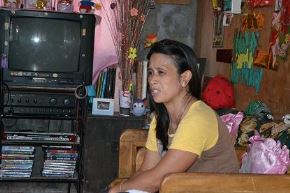
DAVAO CITY (Mindanao Examiner / Dec. 13, 2012) – All she wants for Christmas is for her four daughters to finish their studies despite the seeming abandonment of her husband who is a seafarer since 2010 while hoping for a family reunited.
Courage, faith, and working on odd-jobs sum up the face of Maria Salome Tabudlong, wife of an overseas Filipino worker (OFW), who continuously survives her family through on-call catering, selling home-made bibingka, kutsinta, puto, and other kakanin (rice cakes).
“Our children were growing up and we realized that his work as a machinist in a shop in Matina Aplaya cannot sufficiently provide for our needs, especially for the education of our children,” narrates the 45-year old Tabudlong.
Because of her constant prodding, Tabudlong’s husband applied for a job overseas. “It was really challenging then because his applications resulted to nothing while we have spent so much already,” she reveals. It was not until, 2010 with a financial support from a person with whom Tabudlong’s husband had allegedly a personal affair, that their pursuit of an overseas work realized.
During the first month after her husband was hired as seafarer – even though he never finished any maritime course – she was receiving P20,000 a month.
“I was really contented then because the amount was more than enough to respond to our needs but things suddenly happened,” shares the former lanky baker of a known bakeshop, “because he was sending less and lesser.”
Her husband’s obsession with a woman led to their separation.
“My eldest daughter was not able to cope with our problem and she even slashed her wrist out of frustration and discouragement,” Tabudlong reveals.
Coping with this kind of family had never been easy, she says, as her children resorted to confide their problems with peers who were members of a dance group. “My eldest daughter will go out of the house and will return past midnight and my second daughter also did the same thing,” says Tabuldong as she wipes her tears during the interview.
Discipline, she says, was really hard because her husband was away.
Creativity, borne out of her desire to protect her daughters, was Tabudlong’s strength. “I personally decided to join them in their hangouts that would last until 2 a.m. and after several accompaniments, my daughters eventually gave up and told me that they would rather stay at home,” says Tabudlong.
The seeming abandonment forced her to seek opinion from the Public Attorney’s Office. She says the public lawyer, based on her demand that her husband would provide her and their daughters with P30,000 a month financial support, advised her to rethink her position. “I am in the position to demand because my husband even restricted me to ask for his actual salary from his employer,” she says.
Built inside the 300-square meters compound owned by his husband’s family, Tabublong says she wants to keep their house as it is, but laments since there is no one to repair the house. “Things become difficult when there is no guy in the house to fix some damages,” she says.
A suggestion from a friend encouraged Tabudlong to approach the Mindanao Migrants Center for Empowering Actions, a nongovernmental organization that promotes tha welfare of OFWs and their families.
“We had counseling and peer sharing of experiences with other OFW abandoned families from other parts of Davao City. It was there that we realized that we have our rights, as well,” shares Tabudlong.
Through MMCEAI’s Women Reintegration and Recovery program, women like Tabudlong are given soft financial capital to engage in survival business.
“I was able to start a small food business like bibingka and puto. Earnings from this support also helped in paying my daughter’s college tuition fee and some needs of the household,” says Tabudlong. (Rick Flores)

